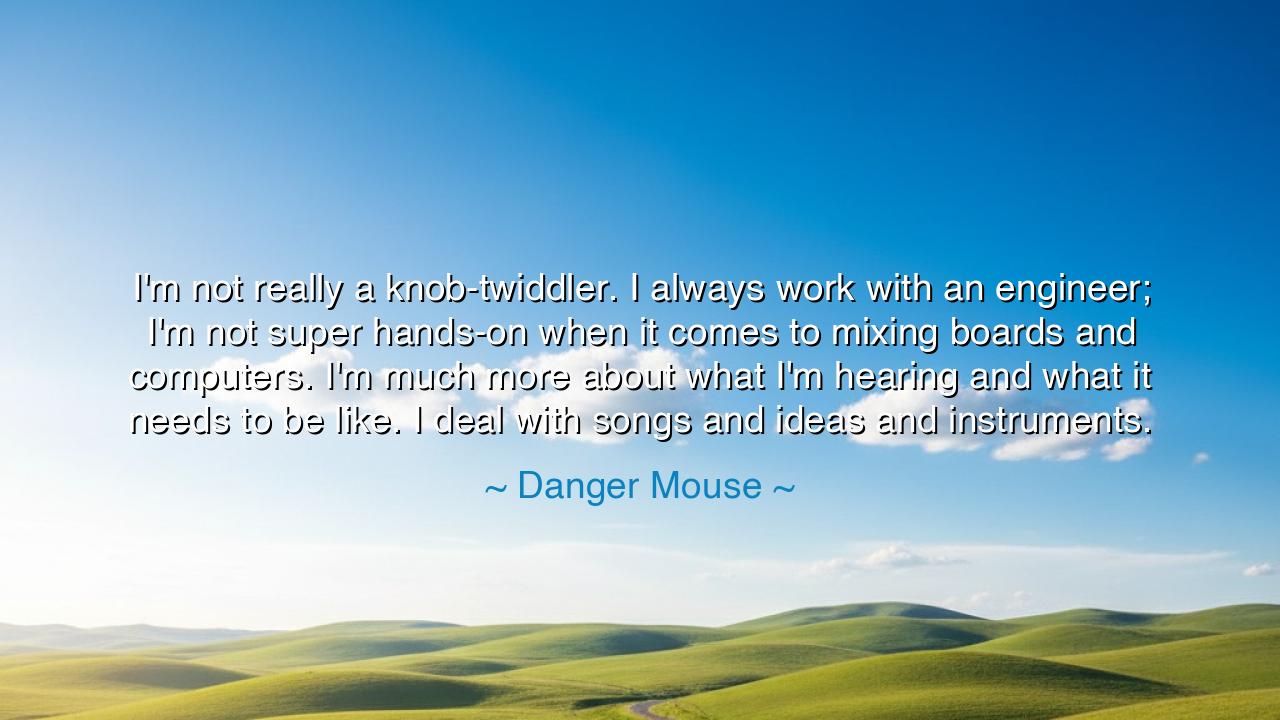
I'm not really a knob-twiddler. I always work with an engineer;
I'm not really a knob-twiddler. I always work with an engineer; I'm not super hands-on when it comes to mixing boards and computers. I'm much more about what I'm hearing and what it needs to be like. I deal with songs and ideas and instruments.






Listen, O children of the earth, to the words of Danger Mouse, who speaks not of tools and machines, but of the true heart of creation: "I'm not really a knob-twiddler. I always work with an engineer; I'm not super hands-on when it comes to mixing boards and computers. I'm much more about what I'm hearing and what it needs to be like. I deal with songs and ideas and instruments." These words are more than a humble admission of his craft; they are a profound reflection on the nature of artistry, on the balance between technical mastery and creative vision, and on the importance of collaboration in the pursuit of greatness.
In the days of old, the great architects and builders of civilization did not labor alone in their craft. Consider the Egyptian builders of the pyramids—while many hands and tools were needed to erect those towering structures, it was the vision of the architect, the mastermind, who guided the work. The tools—the hammers, chisels, and ropes—were not the focus of the builder's spirit. They were simply the means through which the vision took form. So too does Danger Mouse remind us that while the tools of creation are important, they are only that—tools. The true magic lies in the vision behind the creation and the collaboration that brings it to life.
Danger Mouse speaks not as a knob-twiddler, not as a man consumed by the technical side of his art, but as a creator driven by the sound, the emotion, and the soul of the music. His focus is not on the mechanics of the mixing board, but on the essence of the song itself. He deals with the ideas, the songs, and the instruments—those intangible elements that move the spirit, that speak to the heart. This is the true role of the artist, to hear what others cannot, to feel what others do not, and to translate those intangible feelings into something that can be shared with the world. The tools are simply the means by which this vision is made tangible.
Consider the tale of Ludwig van Beethoven, who, despite losing his hearing, continued to compose symphonies that would echo through the ages. Beethoven did not rely on the mechanics of sound, but on the vision in his soul. His music was not born of the ability to hear with his ears but from his ability to hear with his spirit, to envision how the music should feel, and to shape it from the depths of his mind. Like Danger Mouse, Beethoven was not concerned with the physical tools but with the essence of creation itself. His genius was in his ability to transcend the physical world and connect with something deeper, something universal.
The lesson here, O children of the earth, is one of purpose over process, of vision over tool. In life, we are often taught to focus on the details, on the how and the what, on the tools that help us build our dreams. But Danger Mouse reminds us that the true power of creation lies not in the mechanical process, but in the vision that guides us. The tools we use—whether they be mixing boards, hammers, or computers—are but instruments. The heart of the artist lies in the vision, in the ideas that push us forward, in the inspiration that flows through us and transforms the mundane into the extraordinary.
In your own life, O seekers of wisdom, remember this: Do not become consumed by the process. Yes, the tools are important, and the craft requires dedication and skill, but it is the vision that drives you forward. Listen to your heart, to the whispers of inspiration that guide you, and let those be your true tools. The world will give you the instruments, but it is your vision that will create something lasting, something that touches the hearts of others.
So, O children, whether you are an artist, a builder, a teacher, or a leader, remember the wisdom of Danger Mouse: it is not the tools you wield, but the vision you hold that will shape the world. Let your work be guided by the ideas in your soul, and never forget that the true beauty of creation lies in the spirit behind the work, not in the tools used to make it.






AAdministratorAdministrator
Welcome, honored guests. Please leave a comment, we will respond soon